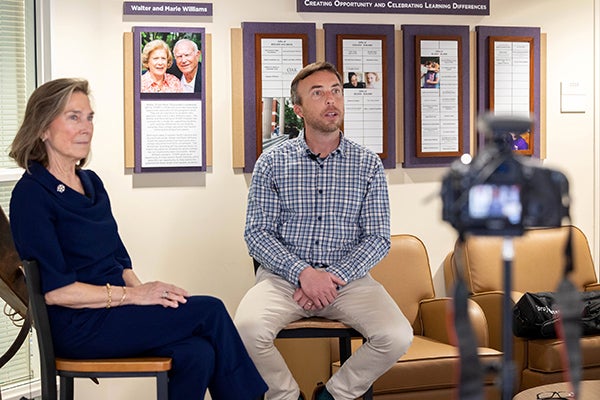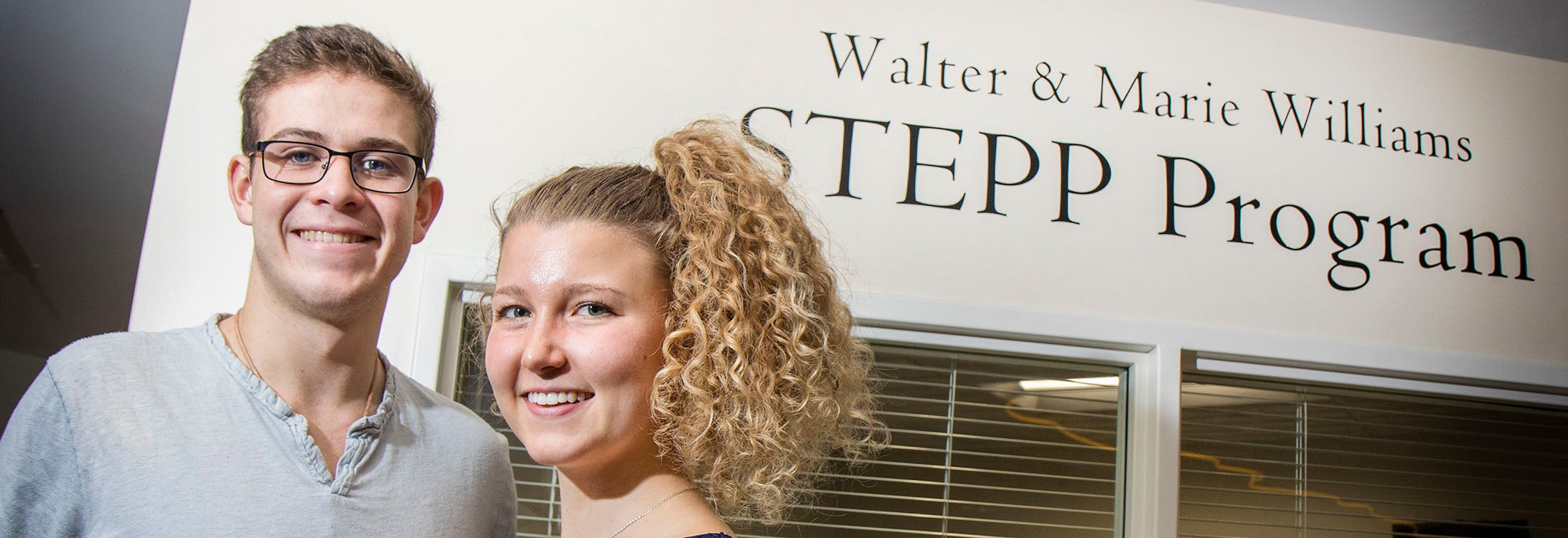A TAILORED STRATEGY
STEPP Program celebrates 15th anniversary
As students with learning disabilities transition from high school to college, East Carolina University’s STEPP Program (Supporting Transition and Education through Planning and Partnerships) helps ensure that they have the support, resources and strategies to succeed and earn a degree. This year the program marks its 15th anniversary.
STEPP, which admits 10 students with each incoming class and serves 40-50 at a given time, starts while the students are still in high school, said Adam Denney, senior associate director for the program. “We learn with our students that whole senior year, so we know coming in we have a basis to start with. We know how to approach them and work with them, and it comes down to individualizing it, working with each one of our students to develop goals.”
Each student has different challenges and different needs.
“Some of it is just learning about when they’re at their best,” Denney said. “What part of the day are they really focused in? Are they early morning risers or (do they work better) in the late afternoon?”
Denney said the program takes an across-the-board approach. From structuring each day with a planner to study hall hours or meeting with tutors, a variety of strategies and resources are tried and tested with each student.
“We spend a lot of time with them, getting to know them as not just a learner, but as an individual … having conversations to better understand what is helpful for them,” he said.
The program was created with the financial help of Walter and Marie Williams, whose grandson Tyler Clark was one of STEPP’s first participants.
“It gave me the opportunity to come in here and get my work done and to have teachers and tutors that I could ask questions to, and gave me the resources that I needed to graduate,” Clark said.

Ann and Tyler Clark discuss the impact of the STEPP Program. (Photo by Rhett Butler)
His mother, Ann Clark, said her father, Walter Williams, shared a vision with then-dean of the College of Education Marilyn Sheerer that ECU could create a model program to support students with learning differences.
“He wanted to give to the university that had given him so much. He was a graduate of East Carolina, undergrad and graduate, and my mom as well,” Ann said.
Tyler, now a successful member of the family business and a father of three, says he would not have been able to complete a college degree without the STEPP Program. “I have a hard time just keeping focused, and I get really easily distracted,” he said. Trying to focus long enough to learn was frustrating, he says, but the program and its tutors provided strategies and helped him see that he really could do the work.
Ann says seeing the students who have been helped over the last 15 years has been incredibly rewarding for the family. “When I look at the STEPP Program and what it’s done, personally, I can speak from the heart and know that the STEPP Program makes a difference,” she said.
Partnerships with agencies and organizations in the community, as well as other departments at ECU, such as the Office for Faculty Excellence and Student Affairs, ensure a strong network of support. The model has even been used as a blueprint by other institutions across the country.
In addition to the Williams’ gift, contributions from other donors have enabled the program to continue. A significant gift from the late Sam Wornom and his wife Sandy helps fund the program’s instructional specialist position, and a $1.5 million grant from the Oak Foundation in support of College STAR (Supporting Transition Access and Retention) is focused on expanding the program’s partnerships nationwide.
Going forward, Denney said he simply wants to see STEPP continue to grow while focusing on the needs of its students. The program’s students and alumni will be invited to attend a tailgate in the fall in conjunction with ECU homecoming, and Denney said he looks forward to seeing past participants and hearing about their professional and personal achievements.
“The impact is just so great,” he said. “It’s incredible to see our students get here and figure out an academic program, and then start to develop those plans … and just blossom. They get into student organizations, they become more involved at the university and they kind of lead in their own way,” he said. “There isn’t one student that I’ve engaged with that has gone through this program … that hasn’t noted how important it was to their individual success.”
ECU is in the public phase of the Pursue Gold campaign to raise half a billion dollars. This ambitious effort will create new paths to success for Pirates on campus, across the country and around the world. Donor gifts during the campaign will keep us constantly leading and ready to advance what’s possible. Learn more at pursuegold.ecu.edu.
Related
$1.5 Million Grant to Expand Student Learning
STEPPing Up
